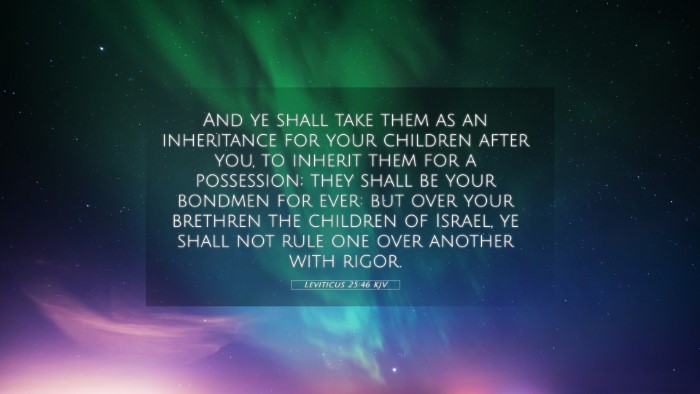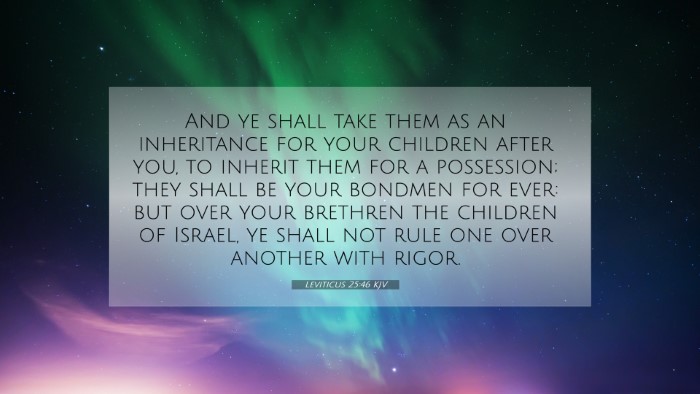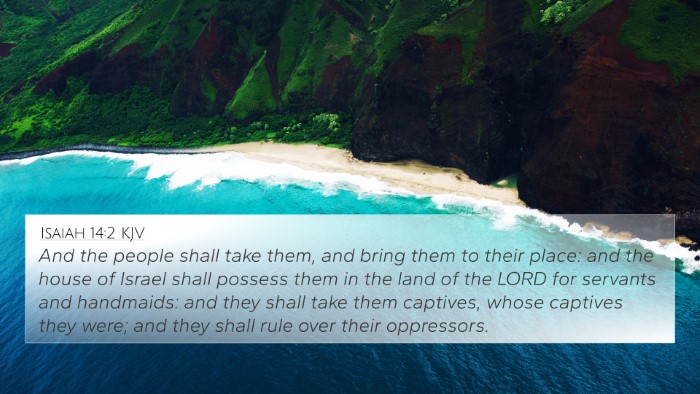Understanding Leviticus 25:46
Leviticus 25:46 states, "And you shall take them as an inheritance for your children after you, to inherit them as a possession; they shall be your permanent slaves. But regarding your brothers, the children of Israel, you shall not rule over one another with rigor."
This verse is part of the larger context of the Jubilee laws, where God outlines the practices regarding the treatment of servants and land ownership. It underscores the importance of compassion, dignity, and familial ties within the Israelite community.
Commentary Summaries
Matthew Henry
Matthew Henry emphasizes the socio-economic implications of this verse. He points out that while it allows for the inheritance of slaves, it also serves as a reminder of God’s ultimate ownership of all. The positioning of these regulations speaks to the cultural context of slavery in ancient Israel but also highlights the special status that Israelites held amongst themselves.
- Family Legacy: Henry views the verse as solidifying a lineage that not only affects physical possessions but also impacts ethical responsibilities.
- Divine Rights: He notes that the verse places limits on the harshness of servitude, especially among fellow Israelites.
Albert Barnes
Albert Barnes discusses the rationale behind the institution of slavery in Israel, indicating that while it was allowed, it was not to be oppressive. He highlights how these laws function as a means of provision both for the poor and for those who are unable to support themselves.
- Moral Boundaries: Barnes stresses the importance of moral considerations in the treatment of fellow Israelites and reminds us that the overarching law is love and care.
- Property and Rights: He also explains that this system was designed to ensure that all members of society had a means of subsistence.
Adam Clarke
Adam Clarke delves into the philosophical underpinnings of the laws concerning slavery. He argues that although servitude is mentioned, the text implicitly encourages humanity and respect in these relationships. Clarke provides a critical analysis of how this verse informs our understanding of social justice.
- Human Dignity: Clarke points out that even those who are enslaved are still viewed as possessing inherent worth.
- System of Justice: He illustrates the biblical text as advocating for a system that prevents exploitation.
Bible Verse Cross-References
This verse relates to several other passages in the Bible that deal with themes of servitude, social justice, and community relations. Here are ten significant cross-references:
- Exodus 21:2-6 - Discusses the treatment of Hebrew servants.
- Deuteronomy 15:12-15 - Addresses the release of Hebrew slaves in the seventh year.
- Leviticus 25:10 - Pertains to the Jubilee year and freedom for the enslaved.
- Matthew 20:25-28 - Jesus teaches about servanthood and humility.
- Galatians 5:13 - Encourages believers to serve one another in love.
- James 5:4 - Warns about the exploitation of laborers.
- 1 Timothy 6:1-2 - Instructions on slaves and their attitude towards masters.
- Colossians 3:22-24 - Advises servants to obey their masters sincerely.
- Romans 12:10 - Encourages believers to love one another and honor each other.
- Philippians 2:7 - Discusses Christ taking the form of a servant.
Conclusion and Thematic Connections
Leviticus 25:46 encapsulates essential principles regarding the treatment of others, with a heavy emphasis on ethical responsibilities among the people of Israel. As one engages in cross-referencing Biblical texts, one begins to see a larger narrative regarding justice, compassion, and the inherent dignity of every individual within the framework of faith.
Further Reflection
Engaging in comprehensive Bible cross-reference materials allows one to deepen understanding and recognize links between Old and New Testament teachings. For those studying how to find cross-references in the Bible, tools such as a Bible concordance or cross-reference Bible study guides can significantly enhance one's insight into the text.




